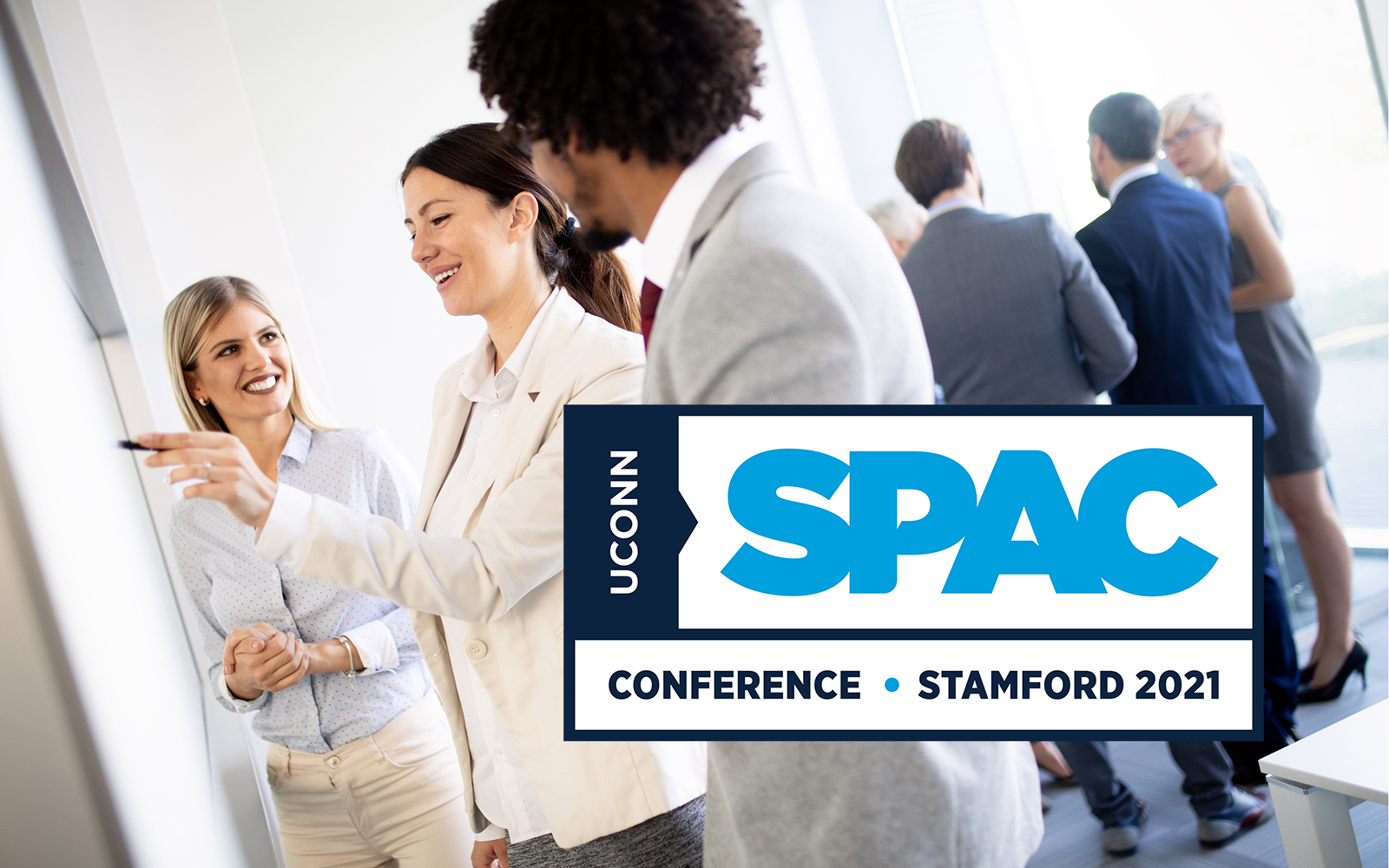
With Special Purpose Acquisition Companies (SPACs) exploding in growth and professional intrigue, the School of Business offered a financial conference to explore the business model, its advantages, and challenges.
Some 275 people participated in the UConn SPAC Conference, believed to be the first university-sponsored conference of its kind in the nation.
Among the presenters at the conference, held at the UConn Stamford campus, were:
- Jay Ritter, Joseph B. Cordell Eminent Scholar and professor of finance, University of Florida;
- John Coates, Vice Dean for Finance and Strategic Initiatives at Harvard and the former Acting Director, Division of Corporation Finance at the U.S. Securities and Exchange Commission;
- Alumnus George Barrios ’87, ’89 MBA, former co-president of WWE and now founder and co-CEO of Isos Capital Management, which recently created a SPAC scheduled to merge with Bowlero Corp., the owner and operator of 300 bowling centers in the U.S.; and
- UConn Professor Yiming Qian, finance professor and Toscano Family Chair in Finance, who spoke on sponsor expertise and SPAC outcomes.
Qian, the event organizer, said that the conference featured two things that the UConn School of Business’ strategic plan emphasizes: innovative thinking and community engagement. “It enhanced the School’s reputation as a thought leader in business and finance and as a supporter to the state’s economic development,” she said.
“Conference attendees liked that the program covered various perspectives, those of sponsors, investors, auditors and researchers, as well as the legal and regulatory aspects of SPACs,” she said. “UConn students also appreciate the exposure to the forefront of market developments and the opportunity to network with industry professionals.”
Why SPACs? Why now?
SPACs are not new, but really weren’t a significant force in the financial world until 2020. This year alone there are already more than 500, often in the technology, healthcare, renewables, gaming and sports industries.
A SPAC is a publicly traded company created to pool funds (the proceeds raised in the SPAC IPO) in order to acquire or merge with a private firm. It is also known as a blank-check company. When an investor buys into a SPAC, he or she is giving money to the founder, or sponsor, without knowing exactly how it will be invested. But for investors interested in getting in on the ground floor, the modest $10 price of shares and a no-risk investment due to the redemption option, can be appealing.
Upon the acquisition or merger, the private firm then becomes publicly traded. Hence, SPAC is an alternative way for private firms to go public versus the traditional IPO.
Proponents of SPACs argue that it gives private companies an additional channel to go public, and offers investors the opportunity to invest early in a startup. But opponents are concerned about inadequate disclosures compared to traditional IPOs. There is also a wide dispersion in terms of post-merger performance.
Barrios, the SPAC sponsor, told the audience that two years ago he didn’t know what a SPAC was. Today he is fully emerged in one. Barrios said that SPACs are an alternative to an IPO, but not a shortcut in business. Having strong, respected and well-known leadership is an important differentiator in the process and draws the right people to the investment, he said.
Barrios, who grew WWE from no social media presence to 1 billion followers, said he was known for amassing a team of tough, hardheaded, impatient people. “If we say we’re going to deliver something, we will,” he said.
Ritter, the University of Florida professor, said the conference was valuable, even for those who have had decades of industry experience.
“Two years ago, very few people had heard of SPACs. They have a lot of unusual features, and it has been interesting to figure out what the costs and benefits of these features are,” he said. “The conference brought together very knowledgeable experts from both industry and academia, including John Coates, who knows more about the regulation of SPACs than anybody. Everybody learned something.”
Coates, the former SEC acting director, said he thinks the popularity of SPACs has, overall, been healthy, drawing in new people and different ways of doing business. The combined academic and practitioner discussions are productive, particularly when a topic is as complex and dynamic as SPACs.
“I thought the presentation by Mr. Barrios was useful, as it gave a clear example of one kind of SPAC sponsor with distinct goals and rationale for using the SPAC structure,” he said. “That talk also was complemented well by the findings reported by Professor Qian, on the range of types of sponsors and the fact that average outcomes vary across those types. Her findings, in turn, complemented Professor Ritter’s general findings on returns to different SPAC participants.”
The program concluded with a speaker panel including Michael Brooder, managing partner of Marcum LLP, Kevin Rakin, co-founder of HighCape Capital and Matt McCooe, CEO of Connect Innovations. The panelists discuss various issues from the perspectives of investors, sponsors, and auditors.
John A. Elliott, Dean of the School of Business, said the conference ignited many important conversations. “This SPAC conference brought together scholars, investors, finance professionals, lawyers, and more to examine a very dynamic and timely aspect of financial markets. In the process, we are serving their needs while enriching our faculty and students.”
“The conference is part of our mission to bring together prominent academics and practitioners and present a forum to our alums, students, and financial experts to explore, learn, discuss the new and emerging ideas and issues in the business world,” said professor Chinmoy Ghosh, head of the Finance Department. “It was well attended by faculty, students and practitioners, and we know from the feedback that the conference achieved its purpose.”